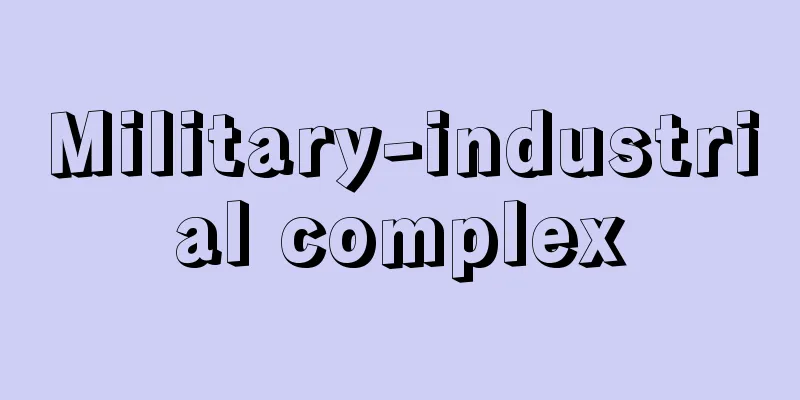Military-industrial complex

|
The term "military-industrial complex" refers to a social collusion structure in which the military, private companies, and politicians, who are heavily dependent on government defense spending, maintain tangible and intangible cooperation for their respective interests, and sometimes the media also participate, in an effort to increase defense spending. The term "military-industrial complex" has been established as a political term since President Eisenhower warned of the existence of the military-industrial complex in his farewell speech in 1961. In general, weapons procurement is conducted in a way that differs from normal commercial transactions, with unique pricing, monopoly delivery procedures, and strict secrecy, making it easy for collusion to occur between the military and industry. Politicians and research institutions such as universities may also be involved. The United States was called the "Arsenal of Democracy" during World War II and played a major role in supplying war materials to the Allied powers, but on the other hand, the entire economy was unable to escape from its tendency to be heavily dependent on government spending, especially defense spending. After World War II, the Korean War (1950-53) and the Vietnam War (1964-73) were the catalysts for the boom in war-related industries, clearly reflecting the nation's dependence on military demand. On the other hand, America's war interventions resulted in heavy casualties among its soldiers, and for this reason America has shifted to a policy of relying on the self-help efforts of the nations involved in regional security (the Nixon Doctrine). However, America needs to maintain its position as a supplier of military aircraft, missile weapons, combat vehicles, ships, and other advanced technologies, so it continues to maintain and develop its military-industrial complex by urging other nations to purchase weapons in addition to its domestic demand, and so-called foreign demand. In France, Germany, Japan, and other countries, too, the dependence of weapons-related industries on defense spending is becoming more and more established. [Shunichi Fujimura] "A Study of the American Military-Industrial Complex" edited by Takashi Obara (1971, Japan Institute of International Affairs) Source: Shogakukan Encyclopedia Nipponica About Encyclopedia Nipponica Information | Legend |
|
政府の国防支出に大きく依存する軍部、民間企業、政治家たちが、それぞれの利益のために有形無形の連携を保ちつつ、ときにはマスコミ界も参加して、国防支出の増大を図る社会的な癒着構造をいう。軍産複合体という用語は、アメリカのアイゼンハワー大統領が1961年の退任演説で軍産複合体の存在を警告して以来、政治用語として定着した。一般に兵器調達は、独特な価格決定、独占的な納入手続き、厳重な機密扱いなど、通常の商取引とは異なる方法で行われるため、軍部と産業界の間で癒着が生じやすい。これに政治家、大学などの研究機関が加わることもある。アメリカは第二次世界大戦では「民主主義の兵器廠(しょう)」とよばれ、連合国側の戦争資材の供給に大きな役割を果たしたが、その反面、経済全体が政府支出、とくに国防支出に大きく依存する体質から脱し切れなくなった。第二次世界大戦後、朝鮮戦争(1950~53)やベトナム戦争(1964~73)によって戦争関連産業が潤った事実をみても、経済の軍需依存を如実に反映している。反面、アメリカの戦争介入は参戦兵士の犠牲が大きく、このためアメリカは地域の安全保障は関係国の自助努力による方針(ニクソン・ドクトリン)に転換したものの、高度先端技術を駆使した軍用機、ミサイル兵器、戦闘車両、艦艇などの供給国としての地位は確保する必要があるため、兵器の内需以外に各国に兵器の購入を迫る、いわゆる外需も併用してアメリカの軍需産業の保持、育成の方針には変わりなく、軍産複合体の体質はいぜんとして続いている。なおフランス、ドイツ、日本などでも兵器関連産業界の国防支出依存という体質が定着化しつつある。 [藤村瞬一] 『小原敬士編『アメリカ軍産複合体の研究』(1971・日本国際問題研究所)』 出典 小学館 日本大百科全書(ニッポニカ)日本大百科全書(ニッポニカ)について 情報 | 凡例 |
Recommend
Sumo stable - Sumobeya
In sumo wrestling, there are sumo stables that are...
Copper mineral
A mineral that contains copper as its main compone...
Flatbug - Flatbug (English spelling)
A general term for insects in the order Hemiptera...
Usuisha - Usuisha
A representative silk-reeling association establis...
Bulbophyllum drymoglossum Maxim.ex Okubo
A small orchid plant that grows on rock walls and ...
Gantt Bonus Plan
...However, for business managers, the ideal has ...
Atany - Atany
…Higher-ranking lawyers (sergeants, later barrist...
Takaki [town] - Takaki
A former town in Kitatakaki District, eastern Naga...
Irish Setter
⇒Irish Setter Source: Kodansha Dogs & Cats: Pe...
Length - zhang-liang; chang-liang
In China, this refers to the measurement of land a...
Catholic (General) Epistles
The term refers to the seven letters in the New Te...
Sawada Touko - Sawada Touko
A calligrapher of the Tang style in the mid-Edo p...
Gonsai Asaka
Year of death: November 21, 1861 (January 1, 1861)...
Yi Sun-shin
A famous naval commander in the Joseon Dynasty, K...
Minos (English spelling)
In Greek mythology, King of Crete. Son of Zeus and...





![Kangrande [I] - Kangrande](/upload/images/67d03139d80e5.webp)



